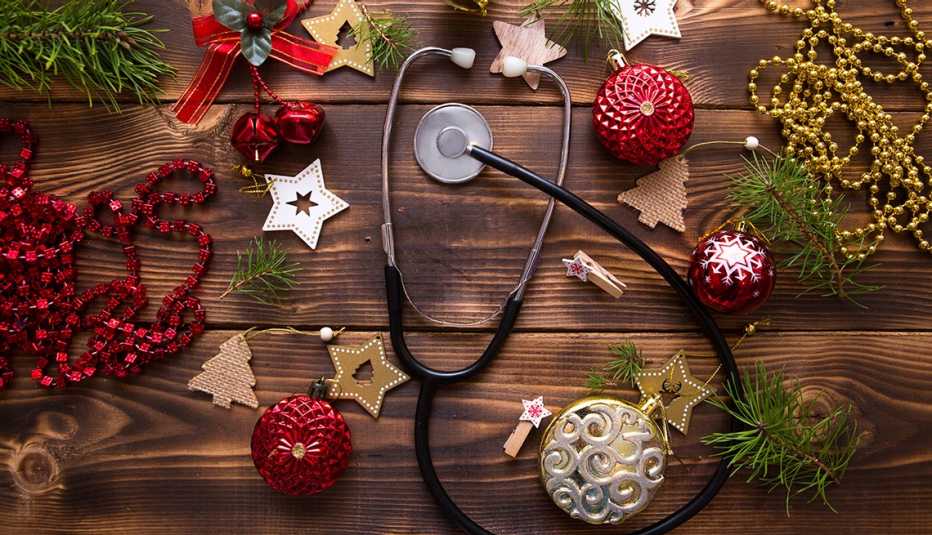AARP Hearing Center


For most of us, the holidays are a time of celebration. But along with all the roasted ham and spiked eggnog, there are two heart health concerns linked to the season: increased risks for holiday heart syndrome and heart attacks.
Holiday heart syndrome occurs when you partake in binge drinking and develop temporary atrial fibrillation, or A-fib (irregular heartbeat), and other tachyarrhythmias (fast heart rhythms) as a result of having alcohol. The syndrome is also linked to heart attacks.
According to the Cleveland Clinic, you’re more likely to develop this syndrome if you:
- Have high blood pressure, diabetes, sleep apnea or obesity
- Have an existing issue with your heart or its structure (including valves)
- Are male and white
Symptoms of holiday heart syndrome include heart palpitations, fatigue, chest pain, shortness of breath and weakness.
Holiday heart syndrome may be more problematic with age because older adults, especially those 65 and older, tend to have a higher likelihood of sustained A-fib, more symptoms (like shortness of breath) and a reduced ability to convert back to their regular rhythm because of other health ailments, says Dr. Michael Miller, a cardiologist at Philadelphia’s Penn Heart and Vascular Center.
This can increase the risk of complications, including stroke, he says. As a result, the older you are with holiday heart syndrome, the more likely you need formal rhythm control measures and treatments, he adds.
Holiday heart syndrome isn’t the only holiday-related health ailment. Research shows that more people die from heart attacks during the last week of December than at any other time of the year. According to a study published in the journal Circulation, more cardiac deaths occur on Dec. 25 in the United States than on any other day of the year, followed by Dec. 26 and Jan. 1.
“No one wants to think of tragedy during this joyous time of year as we gather with family and friends,” says Dr. Johanna Contreras, a cardiologist at New York City’s Mount Sinai Health System. “However, these startling facts are very sobering. We don’t know exactly what triggers this increase in heart attacks during the holidays. It’s likely a combination of factors.”
In fact, the number of heart-related deaths in the United States increases by about 4 percent during the December and New Year holidays, according to a 2016 study published in the Journal of the American Heart Association. A 2018 analysis published in the BMJ (British Medical Journal) found that the risk of having a heart attack is about 37 percent higher on Christmas Eve. People over 75 and those with chronic health conditions such as heart disease or diabetes are at greater risk.
“During December, people take a holiday from taking care of their health, which isn’t good for their hearts,” says Dr. Nieca Goldberg, medical director of Atria NYC and a clinical associate professor of medicine at New York University.
Scientists aren’t sure how alcohol can lead to heart rhythm abnormalities, but drinking can interact with the heart’s electromechanical activity. It may affect the heart indirectly, as vomiting from alcohol could disturb electrolyte levels that affect the heart. Your chances of getting holiday heart syndrome go up the more you drink, the American Heart Association (AHA) says.
Why the holidays are harmful
This time of year can be so tough on your ticker for a few reasons. They include:
Stress. Whether it’s the bustle of holiday travel or feeling financially overstretched from shopping for gifts, this time of year can put a lot of strain on your body. “When you’re stressed, your brain produces more stress hormones such as cortisol, which are bad for heart health,” says Dr. Donald Lloyd-Jones, a professor at Boston University’s Chobanian & Avedisian School of Medicine and a former AHA president.
In fact, people with high levels of cortisol are five times more likely to die of a heart attack or stroke, even if they don’t already have heart disease, according to research published in The Journal of Clinical Endocrinology & Metabolism.




































































More From AARP
Age and Alcohol: 7 Reasons They Don't Mix
Medium Promotional Description (180 char.)
Is Alcohol Causing Your High Blood Pressure?
Even moderate alcohol intake could raise your riskIs It Safe to Drink Alcohol?
A doctor’s advice on the health risks of wine, beer and cocktails